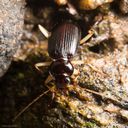Gazelle Beetles
Nebria
Classification
- Phylum: Arthropoda
- Subphylum: Hexapoda
- Class: Insecta
- Order: Coleoptera
- Suborder: Adephaga
- Family: Carabidae
- Subfamily: Nebriinae
- Tribe: Nebriini
- Genus: Nebria
Pronunciation
How to pronounce Nebria: //ˈnɛb.ri.ə//
These audio files are automatically generated. While they are not always 100% accurate, they are a good starting point.
Images






Summary
Nebria is a genus of ground beetles found mostly in cooler, moist areas of the northern hemisphere. With over 500 described species, they play a vital role as predators in their ecosystems, helping control insect populations.
Physical Characteristics
Ground beetles, generally characterized by their elongated bodies and hardened forewings. The coloration can vary widely among species, often adapted to their specific habitats.
Identification Tips
Look for elongated bodies and the characteristic coloration that blends into their habitats. They typically rest under stones or debris, making them easier to locate in such areas.
Habitat
Cool or cold streams, wet places in forested areas, under leaf litter, and on snow fields in high montane regions.
Distribution
Primarily Holarctic; in North America, found from the Arctic south to New Mexico and Arizona along the Rockies, and to Virginia and Tennessee in the Appalachians. Most Nearctic species are located in the western regions.
Diet
Predatory, feeding on a variety of smaller invertebrates, particularly in moist environments.
Life Cycle
Typically undergo complete metamorphosis with distinct egg, larval, pupal, and adult stages. Specifics can vary by species.
Reproduction
Details on reproductive behavior can vary, but ground beetles generally lay eggs in soil or substrate where larvae will emerge and develop.
Predators
Natural predators include larger ground beetles and various birds that hunt in their habitats.
Ecosystem Role
Important predators of pest insects, contributing to the natural balance of their ecosystems.
Economic Impact
Potentially beneficial in agricultural settings due to their predatory nature, controlling pest populations.
Collecting Methods
- Searching under stones and rubble
- Using pitfall traps
- Trapping near water margins
Preservation Methods
- Pinning adults
- Using alcohol for larval specimens
Evolution
The Nebria genus is part of the Carabidae family, which has evolved to occupy a variety of habitats across the Holarctic region.
Similar Taxa
Misconceptions
Often confused with other ground beetles; some may assume they are all harmful due to their predatory habits, but they are generally beneficial in ecosystem management.
Tags
- beetles
- insects
- predators
- Holarctic